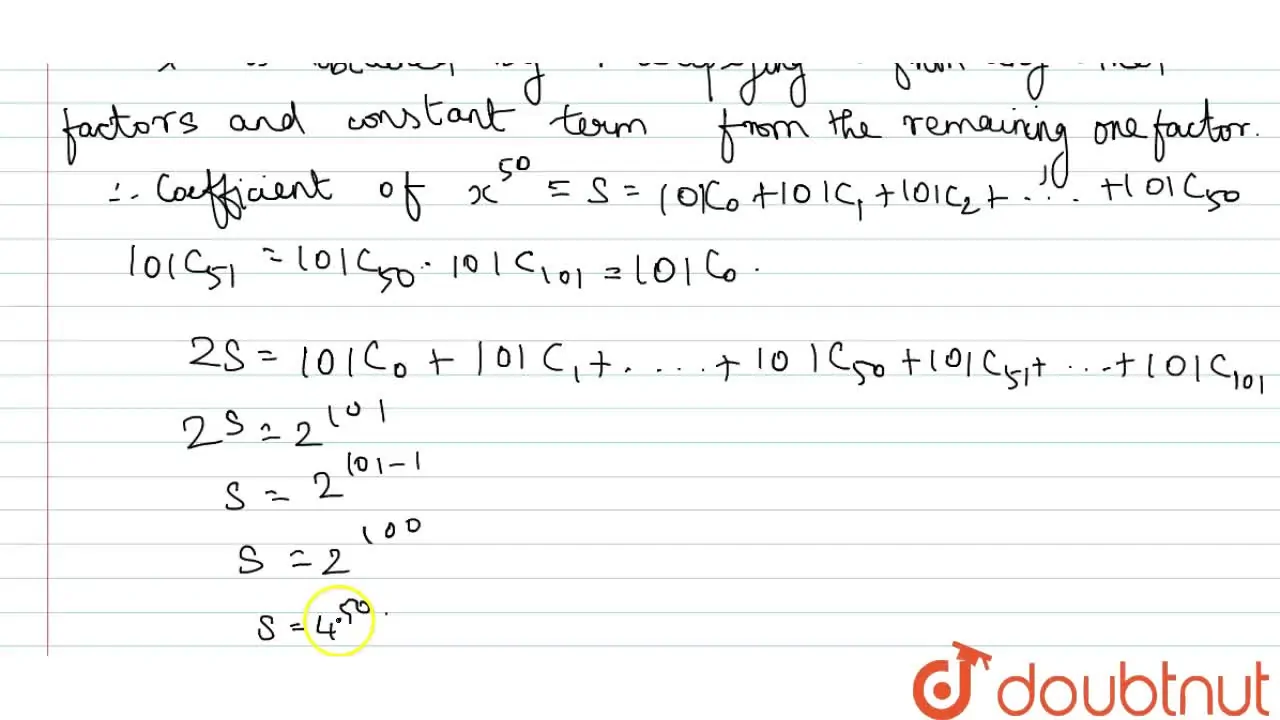The value of ∣∣ ∣ ∣∣βγβγ'+β'γβ'γ'γαγα'+γ'αγ'α'αβαβ'+α'βα'β'∣∣ ∣ ∣∣ isSolution in Tamil
(αβ'−α'β)(βγ'−β'γ)(γα'−γ'α)
(αα'−ββ')(ββ'−γγ')(γγ'−αα')
(αβ'+α'β)(βγ'+β'γ)(γα'+γ'α)
None of these
The correct Answer is:A
(a) 1αβγ∣∣
∣
∣∣αβγαβγ'+αβ'γαβ'γ'αβαβγα'+βγ'αβγ'α'αβγαβ'γ+α'βγα'β'γ∣∣
∣
∣∣
Multiplying R1 by α, R2 by β and R3 by γ and dividing the determinant by αβγ we have
=1αβγ⋅αβγ∣∣
∣
∣∣1αβγ'+αβ'γαβ'γ'1βγα'+βαγ'βγ'α'1γαβ'+γα'βγα'β'∣∣
∣
∣∣
by R3→R3−R1R2→R2−R1
=∣∣
∣
∣∣1αβγ'+αβ'γαβ'γ'0γ(α'β−αβ')γ'(α'β−αβ')0β(α'γ−αγ')β'(α'γ−αγ')∣∣
∣
∣∣
=(α'β−αβ')(α'γ−αγ')∣∣
∣
∣∣1αβγ'+αβ'γαβ'γ'0γγ'0ββ'∣∣
∣
∣∣
=(α'β−αβ')(α'γ−αγ')(γβ'−βγ')
Related Playlists
- BOOK - CENGAGECHAPTER - DETERMINANTEXERCISE - Comprehension2videos
DETERMINANT
- BOOK - CENGAGECHAPTER - DETERMINANTEXERCISE - Multiple Correct Answer5videos
DETERMINANT
- BOOK - CENGAGECHAPTER - DEFINITE INTEGRATION EXERCISE - JEE Advanced Previous Year38videos
DEFINITE INTEGRATION
- BOOK - CENGAGECHAPTER - DETERMINANTSEXERCISE - All Questions268videos
DETERMINANTS
Similar Questions
A 3×3 determinant has entries either 1 or −1.
Let S3= set of all determinants which contain determinants such that product of elements of any row or any column is −1 For example ∣∣ ∣∣1−1111−1−111∣∣ ∣∣is an element of the set S3.
Number of elements of the set S3=05:03View Solutionconsider the fourth -degree polynomial equation
∣∣ ∣ ∣∣a1+b1xa1x2+b1c1a2+b2x2a2x2+b2c2a3+b3x2a3x2+b3c3∣∣ ∣ ∣∣=0
Without expanding the determinant find all the roots of the equation.05:12View SolutionSolve: (x+2)3=2x(x2−1)
05:17View SolutionStatement 1: If bc+qr=ca+rp=ab+pq=−1, then|apapbqbqcrcr|=0(abc,pqr≠0). Statement 2: if system of equations a1x+b1y+c1=0,a2x+b2y+c2=0,a3x+b2y+c3=0 has non -trivial solutions |a1b1c1a2b2c2a3b3c3|=0
02:31View SolutionProve that | [1, alpha, alpha ^ 2 + betagamma], [1, beta, beta ^ 2 + gammaalpha], [1, gamma, gamma ^ 2 + alphabeta] | = 2 (alpha-beta) (beta-y ) (y-alpha)
02:49View SolutionIf α,β,γ are the roots of x3+2x2−x−3=0. If a = α2+β2+γ2,b=αβ+βγ+γα the value of ∣∣ ∣∣abbbabbba∣∣ ∣∣ is
05:23View SolutionIf α,βandγ are the roots of the equation x3−px2+qx−r=0, then the value of αβγ+βγα+γαβ is equal to
02:47View Solutionयदि किसी बहुपद के शून्यक - 2, 1, 4 हो तो निम्नलिखित का मान ज्ञात करें।
(i) α+β+γ (ii) αβ+βγ+γα (iii) αβγ02:16View SolutionIf α,β,γ are the roots of the equation x3+px2+qx+r=0, then find he value of (α−1βγ)(β−1γα)(γ−1αβ) .
03:48View SolutionIf α,β,γ are the roots of px3+qx2+r=0, then the value of the determinant ∣∣ ∣ ∣∣αββγγαβγγααβγααββγ∣∣ ∣ ∣∣ is a. p b. q c. 0 d. r
03:04View SolutionIf α,β,γ are the roots of px3+qx2+r=0, then the value of the determinant ∣∣ ∣ ∣∣αββγγαβγγααβγααββγ∣∣ ∣ ∣∣ is p b. q c. 0 d. r
03:59View SolutionIf α,β,γ be the zeroes of the polynomial x3−6x2−x+30, then αβ+βγ+γα=?
03:56View SolutionIf α,β,γ are the roots of x3+2x2−x−3=0. If a = α2+β2+γ2,b=αβ+βγ+γα the value of ∣∣ ∣∣abbbabbba∣∣ ∣∣ is
05:30View Solutionयदि किसी त्रिघात बहुपद ax3+bx2+cx+d के शून्यक α,β व γ हो तो αβ+βγ+γα का मान होगा-
01:54View SolutionIf α,βandγ are the roots of the equation x3−px2+qx−r=0, then the value of αβγ+βγα+γαβ is equal to
03:23View SolutionIf alpha,beta,gamma are the roots of p x^3+q x^2+r=0, then the value of the determinant |(alphabeta,betagamma,gammaalpha),(betagamma,gammaalpha,alphabeta),(gammaalpha,alphabeta,betagamma)| is p b. q c. 0 d. r
08:24View Solution


